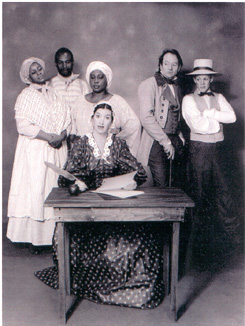 On Feb. 10, HBO aired a monumental documentary film, “Unchained Melodies.” The film, using the faces and voices of African American actors, is the nation’s first network television introduction to one of the most unique archives in the United States: the collection and preservation of the testimonies of more than 2,000 former slaves in the Slave Narrative Collection of the Federal Writers’ Project of the 1930’s. This archive is the tape-recorded voices of ex-slaves, who expose the true, everyday life of average members in the slave community.
On Feb. 10, HBO aired a monumental documentary film, “Unchained Melodies.” The film, using the faces and voices of African American actors, is the nation’s first network television introduction to one of the most unique archives in the United States: the collection and preservation of the testimonies of more than 2,000 former slaves in the Slave Narrative Collection of the Federal Writers’ Project of the 1930’s. This archive is the tape-recorded voices of ex-slaves, who expose the true, everyday life of average members in the slave community.
Between 1760 and 1865, approximately 100 fugitive slaves wrote or dictated book-length accounts of slavery. Another 100 or so people born into slavery published autobiographies between the end of the Civil War and the Harlem Renaissance of the 1920s. But, by the turn of the century, slavery had begun to recede in the consciousness of African Americans because the developing black upper class elite — ashamed of its roots — felt that integration into American society would be easier if white people were no longer reminded of centuries of slavery.
A handful of black historians convinced the federal government of a catastrophic loss to history if the last surviving ex-slaves died without tape recording their memories. These historians feared the rosy image of slavery portrayed in such blockbuster movies as “Gone with the Wind,” would forever dominate the memory of slavery in the American conscience. They wanted the real story recorded for all posterity.
To realize the importance of archivists’ vision consider the crucial and breakneck pace of director Steven Spielberg’s monumental project to videotape the memories of more than 50,000 Holocaust survivors.
“Let My People Go: Trials of Bondage in Words of Master and Slave” is the closest embodiment to the living testimonies of ex-slaves in dramatic production today. More than 18,500 documents, including thousands of pages of direct testimony in courts of law, form the foundation for the stories reenacted. “Let My People Go” is living history. See it on campus Friday at 11:30 a.m in the College of Nursing’s Cooper Auditorium.